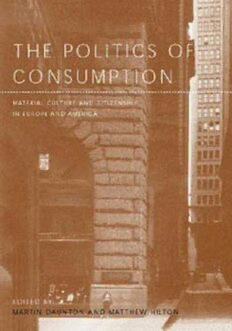
The Politics of Consumption: Material Culture and Citizenship in Europe and America PDF
320 Pages·2001·1.3 MB·English
Most books are stored in the elastic cloud where traffic is expensive. For this reason, we have a limit on daily download.
Preview The Politics of Consumption: Material Culture and Citizenship in Europe and America
Description:
Objects and commodities have frequently been studied to assess their position within consumer - or material - culture, but all too rarely have scholars examined the politics that lie behind that culture. This book fills the gap and explores the political and state structures that have shaped the consumer and the nature of his or her consumption. From medieval sumptuary laws to recent debates in governments about consumer protection, consumption has always been seen as a highly political act that must be regulated, directed or organized according to the political agendas of various groups. An internationally renowned group of experts looks at the emergence of the rational consuming individual in modern economic thought, the moral and ideological values consumers have attached to their relationships with commodities, and how the practices and theories of consumer citizenship have developed alongside and within the expanding state. How does consumer identity become available to people and how do they use it? How is consumption negotiated in a dictatorship? Are material politics about state politics, consumer politics, or the relationship between these and consumer practices?From the specifics of the politics of consumption in the French Revolution - what was the status of rum? How complicated did a vinegar recipe have to be before the resultant product qualified as 'luxury'? - to the highly contentious twentieth-century debates over American political economy, this original book traces the relationships among political cultures, consumers and citizenship from the eighteenth century to the present.
See more
The list of books you might like
Most books are stored in the elastic cloud where traffic is expensive. For this reason, we have a limit on daily download.
